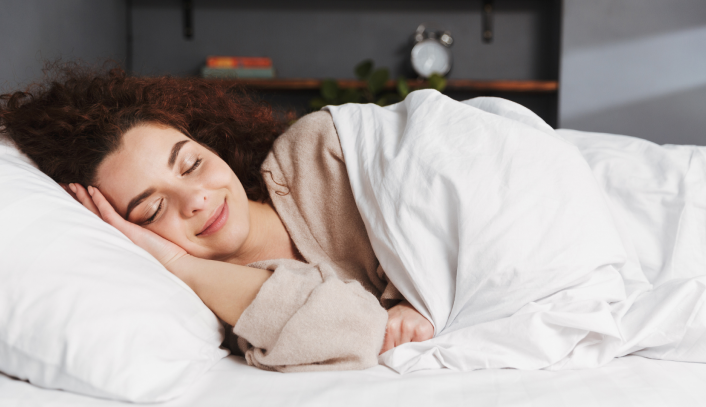When you sleep, your body undergoes a series of changes that enable the rest that is so important to your overall health. A relaxing sleep allows the brain and body to slow down and engage in a recovery process that promotes better physical and mental performance both for the following day and over the long term.
However, as suggested by the Harvard Medical School in their study into achieving a better night’s sleep, there are many reasons why people don’t enjoy a peaceful night’s sleep. The chief reason being people simply are not setting aside enough time because of the fast-paced world we live in today.
Common causes of a sleepless night can also include:
- Insomnia (difficulty falling or staying asleep).
- Lack of exercise.
- Side effects from medication.
- Sleep apnea (a type of breathing disorder during sleep).
- Restless leg syndrome.
- Chronic conditions such as heartburn, heart disease, thyroid disease, depression, and narcolepsy (a disorder of sleep/wake regulation).
Also, exposure late at night to the light from television and computer screens, as well as smartphones, can keep us awake, stimulating our brains and making it harder to fall asleep.
Age is also another culprit that affects our sleep. As we get older, the time it takes to fall asleep is longer. Likewise, the quality of sleep also becomes poorer, resulting in dozens of awakenings during the night.
What we sleep on
Along with the various mental and environmental issues that can stop us from having a good night’s sleep, what we sleep on can also play a pivotal role in why we’re not getting the rest we require.
One of the most significant factors in getting a healthy night’s sleep is the comfort of our mattress. Few other products can play such a material effect on our health and happiness.

With the average person spending around 33 years of their life in bed, our mattress should be comfortable as possible at bedtime.
Today, one of the most popular mattress materials is memory foam. Initially developed by NASA engineers, one of memory foam’s many defining traits is slow response. The material becomes softer and more adaptive when exposed to our body heat, allowing it to mould around the unique contours of our body and then as it cools, the foam returns to its original shape.
Another thing people love about sleeping on a memory foam mattress is the way it offers even contouring and weight distribution, pressure relief along the spine, and superior motion isolation, guaranteeing you the perfect night’s sleep every night.
So as you can see, when we don’t get enough sleep, the fundamental processes are short-circuited, which in turn affects our thinking, concentration, focus, energy levels, and mood.
Getting the sleep we need, seven to nine hours for adults and even more for children and teens, is crucial and here are some of the reasons:
Clearer Brain
By not getting enough sleep, you’ll probably find that you’re having trouble holding onto and recalling details. That’s because sleep plays a huge part in assisting both our learning and our memory.
Without enough sleep, your brain doesn’t have enough time to store memories so you can pull them up later properly; it’s also tough to focus, make decisions and take in new information. Sleep lets your brain clear the decks, so you’re ready to function fully and face the day ahead.
Mood Booster
One major thing your brain does while you’re sleeping is process your emotions. Your mind needs this time in order to recognise itself and react correctly. You tend to have far more negative emotional responses and fewer positive ones when you cut that short.
Chronic sleep deprivation can also raise the chances of having mood disorders, including feelings of depression, lack of motivation and irritability. A recent major study showed that you’re five times more likely to develop depression when you have insomnia, and your odds of anxiety or panic disorders are even more likely.
A refreshing night’s sleep helps you hit the reset button on a bad day, improve your outlook of life, and be better prepared to meet life’s challenges.
A Healthier Heart
When you sleep, your blood pressure goes down, giving your heart and blood vessels the chance to rest. The less sleep you get, the longer your blood pressure stays up. High blood pressure can lead to all manner of health issues and higher chances of conditions like diabetes and heart disease, including suffering a stroke. Relaxed short-term downtime can have significant long-term payoffs.
Fighting Off Viruses & Bacteria
When you sleep, your blood pressure goes down, giving your heart and blood vessels the chance to rest. The less sleep you get, the longer your blood pressure stays up. High blood pressure can lead to all manner of health issues and higher chances of conditions like diabetes and heart disease, including suffering a stroke. Relaxed short-term downtime can have significant long-term payoffs.
Helps With Weight Control
When you’re well-rested, you tend to be far less hungry. Being sleep-deprived messes with the hormones in your brain, leptin and ghrelin, that controlyour appetite.
However, when they’re out of balance, your resistance to the temptation of unhealthy foods goes way down. And also, when you’re tired, you’re less likely to want to get up and move your body. Together, it’s a recipe for pilling on the pounds. The time you spend in bed goes hand-in-hand with the amount of time you spend at the table or at the gym helping to control your weight.
Improving Your Performance
If you’re a professional sportsperson or simply a weekend warrior, a loss of sleep can massively affect your body’s recovery time. Not only does it deprive you of energy and the time it takes for your muscles to repair, but it also saps you of the motivation you need to achieve your ultimate performance continually. Without proper rest, you’ll face more demanding mental and physical challenges and see slower reaction times.

Too Much of a Good Thing
The amount of sleep a person needs depends on many things, including their age, and a lack of sleep saps your motivation and robs your body of energy and the recovery time it needs for you to face mental and physical challenges ahead. However, too much sleep can have an adverse effect on your body.
Sleep needs vary, but on average, regularly sleeping more than 9 hours a night may, in fact, do you more harm than good. A recent in-depth study found that people who slept longer had more calcium buildup in their heart arteries and had less flexible leg arteries. So for peak health benefits, concentration, and focus, your best bet is to look to achieve between 7-8 hours of relaxed sleep each and every night.
